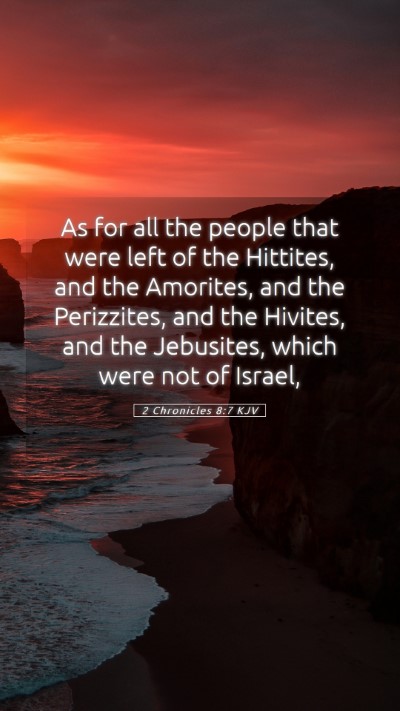Bible Verse Explanation: 2 Chronicles 8:7
The verse 2 Chronicles 8:7 reads: "As for all the people that were left of the Hittites, the Amorites, the Perizzites, the Hivites, and the Jebusites, which were not of Israel," This verse encapsulates the historical context of Solomon's reign and the labor force that contributed to the construction projects he undertook, particularly the Temple.
Meaning of Bible Verse
In understanding this verse, we delve into several critical insights compiled from public domain commentaries:
- Matthew Henry: Henry emphasizes the significance of the continued presence of these nations and their descendants in the land. He notes that these nations represent the remnants of those who were not driven out during the conquest. Their existence reflects both God's mercy and sovereignty as He allows them to coexist with His chosen people.
- Albert Barnes: Barnes explores the implications of this verse in the context of Solomon's projects. He highlights that the Israelites were not forced to labor incessantly; instead, Solomon opted for a workforce that included these foreigners. This choice indicates a strategic decision in governance and resource management.
- Adam Clarke: Clarke provides a detailed analysis of the ethnic groups mentioned in the verse. He categorizes them according to their historical significance and the role they played in biblical history. He notes that these groups were subjected to the Israelites, yet their labor was pivotal in achieving Solomon's ambitious building plans.
Biblical Context and Relevance
To appreciate the full meaning of this verse, one must consider the broader context of 2 Chronicles, especially Solomon’s achievements and the establishment of Israel as a powerful nation. Solomon's era was marked by a focus on peace and construction, contrasting the prior tumultuous times of conquest and warfare.
Significance of the Verse
- Acknowledgment of Diversity: The inclusion of non-Israelite laborers reflects the diverse society in which Israel existed. Their contributions were integral, suggesting unity through mutual benefit.
- God’s Sovereignty: The mention of these nations aligns with God's purpose and providence, showing His control over the historical narrative.
- Teaching on Governance: Solomon's strategy in utilizing these groups teaches valuable lessons on effective governance, diplomacy, and resource allocation.
Cross References
- Deuteronomy 7:1-2: Discusses the command to destroy the nations in Canaan.
- 1 Kings 9:20-21: Details how the remnants of these nations became laborers for Solomon.
- 2 Chronicles 2:17-18: Solomon’s recruiting of a workforce from the nations around Israel.
Applications of the Verse
In applying the understanding of 2 Chronicles 8:7 to daily life, several key lessons emerge:
- Unity in Diversity: Just as Solomon utilized a diverse workforce, we can learn to appreciate the strengths that different backgrounds bring to our lives and communities.
- Strategic Resource Management: Wisdom in leadership and management involves knowing how to best utilize the resources available, including human resources, akin to Solomon’s approach.
- Recognition of God’s Plans: Understanding that God orchestrates events in our lives, leading to partnerships and relationships that may serve His purpose.
Conclusion
In summary, 2 Chronicles 8:7 provides profound insights into biblical history and practical applications for life today. It encourages us to reflect on the importance of diverse contributions, the strategic thinking behind decisions, and the acknowledgment of God's overarching plan in our lives.
For those involved in bible study groups, this verse can be a rich source for discussion regarding God's sovereignty and the integration of differing communities under His divine purpose. Moreover, utilizing bible study tools and bible study resources can deepen one’s understanding of such passages and their implications.


